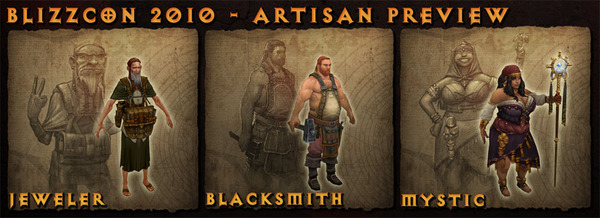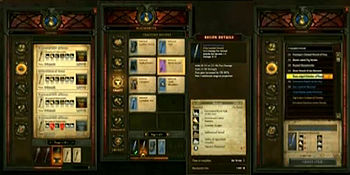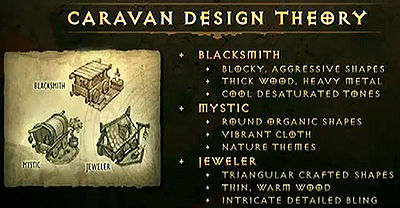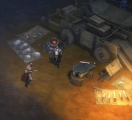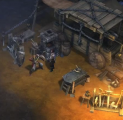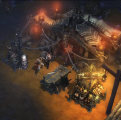Difference between revisions of "Artisan"
(→Training) |
(→Training: added image/info) |
||
| Line 63: | Line 63: | ||
# Glorious | # Glorious | ||
# Exalted | # Exalted | ||
| + | |||
| + | The unlocking of crafting [[recipe]]s is a process of drops, no matter whether the recipes come from training the artisan or from actual recipe drops. | ||
| + | In order to train the artisan, the player will need to collect [[Page of Training|Pages of Training]] which are assembled into a book after five pages are collected. The book is then used, in conjunction with scaling amounts of crafting material and gold, to level up the artisan. | ||
| + | However, it is not one book or gold cost per level. The player will have to "level" the artisan multiple times before the artisan reaches the next rank of progress. | ||
| + | |||
| + | [[Image:bsmith_upgrade_pane.jpg|thumb|300px|The [[Blacksmith]] upgrade pane.]] | ||
| + | |||
| + | Each [[Tome of Training]] that the player hands in will not only get the artisan closer to reaching their next rank of craftsmanship, but it will also teach them new recipes. This is one of two ways to get recipes in Diablo III; the other being lucky drops. It is important to note that increasing an artisans rank beyond a certain point will likely require a different type or "tier" of the training tomes, which are likely to drop in the higher difficulty levels, scaling along with the player. | ||
Revision as of 04:52, 9 September 2011
The Artisans are special kinds of merchant NPCs, introduced in Diablo III. They provide quest information, as well as numerous essential services such as crafting, item repairs, socketing and unsocketing, item enchanting, and much more.
There are three Artisans, the Jeweler, Blacksmith, and Mystic, all of whom travel with the Caravan and are available to the player in each act of the game. Artisans were introduced in August 2010, and are succinctly explained in the Artisan Video, narrated by Jay Wilson.
All players have their own Artisans, with their own levels and recipes. You can not access another players Artisan, and if they have special recipes your Artisans have not learned, you can not use them. Each player will see only their own Artisans in a multiplayer game.[1]
Contents
Overview
Artisans are NPC merchants, "vendors 2.0" as the dev team calls them. They buy and sell items, as well as make item repairs, upgrade gems and runes, and provide all of the crafting services. They have other special features as well; they can be trained, which improves their skills, adds to the crafting recipes they offer, and even improves the appearance of their wagons.
Crafting is their biggest special skill. This form of item creation requires a recipe, materials, and gold, which the Artisan takes and uses to craft a new item with some pre-set and some random properties. This is an upgrade over how crafting worked in Diablo II, and it varies from crafting in most RPGs since the outcome is not entirely predictable; the random properties can roll as a wide variety of modifiers, potentially yielding a fantastic item, or a piece of junk, from the same recipe. Numerous attempts at most recipes are to be expected before a great item is fashioned.
When first encountered, the Artisans seem like any other NPCs. They have problems that must be solved as quests. Only once the Artisans have been impressed by the hero's skill will they join the Caravan and travel with you, offering quest and story information, as well as their talents and abilities, for a price. They have strong personalities and will offer information and input on most quests and other issues in the game. As Jay Wilson explained during the Blizzcon 2010 Crafting Sanctuary panel:
- We tried to make the artisans real people. Not generic. Strong opinions and ideas. They view you and your actions in real terms and talk about it.
The Three Artisans
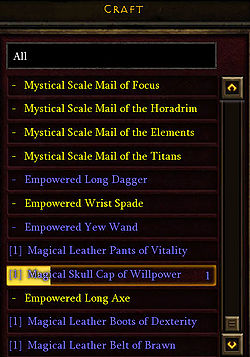
There are three Artisans in Diablo III. Each of these NPCs will be encountered during the course of the gameplay, and once their quest is completed they will join up with the Caravan and travel with the player for the rest of the game.
See their individual pages for many more details.
The Blacksmith
Haedrig Eamon, the Blacksmith is the only Artisan yet named. He is the first one encountered, early in Act One, and he gives the player the Salvage Cube, which is used throughout the game to break down items into materials for crafting.
The Mystic
The Mystic has not yet been named, but it's widely rumored that she might be Adria, returned in Diablo III. Her talents involve creating magical objects.
- Special Abilities: Enchanting Items.
- Crafting Specialties: Magical Weapons, Runestones, Charms, Potions, Scrolls.
Jeweler
The Jeweler is also unnamed, so far. He is said to be a greedy, avaricious fellow, who accompanies the player out of a desire for riches. He deals in gems and crafting jewelry.
Training
Artisans can be trained to higher levels, gaining a new title and improved wagon appearance each time. The maximum level is five (until the expansion?), and with each level the artisans learn new recipes to craft.
Training is not free; it costs increasing amounts of gold and materials, but players will always want to train up their Artisans, since this enables them to create higher quality items from better recipes.
The developers have said that Artisans can be upgraded to a fifth level of expertise, in Diablo III. The game code lists up to ten levels, but we should only see five in the initial release, with others possibly added in expansions or patches.
- Apprentice
- Journeyman
- Adept
- Master
- Grandmaster
- Illustrious
- Magnificent
- Resplendent
- Glorious
- Exalted
The unlocking of crafting recipes is a process of drops, no matter whether the recipes come from training the artisan or from actual recipe drops. In order to train the artisan, the player will need to collect Pages of Training which are assembled into a book after five pages are collected. The book is then used, in conjunction with scaling amounts of crafting material and gold, to level up the artisan. However, it is not one book or gold cost per level. The player will have to "level" the artisan multiple times before the artisan reaches the next rank of progress.
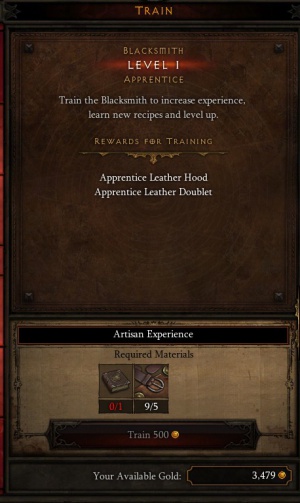
Each Tome of Training that the player hands in will not only get the artisan closer to reaching their next rank of craftsmanship, but it will also teach them new recipes. This is one of two ways to get recipes in Diablo III; the other being lucky drops. It is important to note that increasing an artisans rank beyond a certain point will likely require a different type or "tier" of the training tomes, which are likely to drop in the higher difficulty levels, scaling along with the player.
Specialization
In addition to being trained up, Artisans can be specialized in creating various item types. Jay Wilson spoke on this from Gamescom, in August 2010.[2]
- Jay Wilson: After you’ve max leveled your Artisan, you can specialize them in areas. They’re not exclusive, if you want to just make axes, you don't omit the ability to make swords or armor. Each path is its own time and resource commitment. And you can specialize in item types that you like the best.
Another comment on the same issue: [3]
- Moreover, you can specialize the three Artisans. The Blacksmith, for instance, can specialize in the crafting of axes. Then you will mostly see axes lying at his stall. Those specializations will not exclude other ways, however. If you are completely specialized in the crafting of axes, you can still try to make the Artisan learn another specialization, by gathering the right recipes and resources.
How specialization will work for the Mystic and Jeweler isn't yet known; perhaps the jeweler will know hundreds of recipes for rings and amulets, but will show more recipes for jewelry with good bonuses for melee combat, or spell-casting, or whatever your character desires?
Development
Artisans were revealed in August 2010, at the Gamescom show in Cologne, Germany. Nothing was revealed about their development at that point (other than the fact that it was ongoing, with the Mystic and Jeweler not yet ready to be revealed), but during the Crafting Sanctuary panel at Blizzcon 2010, the developers shared some "making of" information about the Artisans.
The Artisan Interface
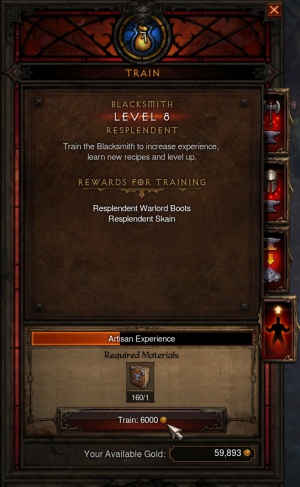
The Artisans interface window is a very functional interface. You see it to the right, with the icons down the left side clickable to open a new tab in the main window.
Diablo III Interface elements:
The design goal for the Artisan interface was something that was, "Quick to pick up, simple to use, and that let the player get about the business of killing things." They wanted to maintain a consistency of artisan interface design between the characters, and scrapped some early designs where the designs differed too much between the Artisans.
The image to the left shows the working models. The early designs for the crafting/recipes window had too much text information and not enough space for recipes. Only 4 items could be shown at once, which meant players had to scroll through multiple pages to see all of the options. Through multiple iterations the design was simplified with less information shown, until they got to a stage where ten items could be seen at once. That was still too cumbersome and presented too much information at once, and it got further simplified to the current design with just the item name and a progress bar behind it. That design is shown higher up this page.
Another early complexity was the time required to craft items. They had ideas they thought were great; "Let's make some top items take a full day to craft!" This was cool in theory, but lousy in practice since no one liked waiting that long to see how their effort turned out.
Wagon Design
Another design issue was wagons of the Artisans. They dialed in the blacksmith's wagon look fairly quickly, but had more trouble with the other two Artisans.
The Mystic was hard to design. They knew they wanted round shapes and lots of natural wood, but their early designs had her wagon looking too much like the Blacksmith's. They ultimately decided to make her whole layout round and organic.
The Jeweler was also hard to design, for a different reason. It's easy to show the progression through the levels for the Blacksmith and Mystic, since their wagons get more ornate and they've got obviously higher level items lying around. But since the Jeweler only upgrades and crafts tiny objects like gems and jewelery, the artists couldn't show his higher level through those items. The ultimately decided to show his higher level largely through his wagon, by making it get much larger over time, with more intricate details, gold-plating on the sides, etc.
As the developers said, "Everyone levels up in Diablo. Even the vendors."
Media
| Characters & NPCs[e] Import. Chars Rumoured Diablo 3 NPCs Diablo 2 NPCs Diablo 1 NPCs Minor A-K Minor L-Z Fanmade |
|---|
| Important Characters |
Angiris Council Lords of Hell |
Horadrim Miscellaneous |
Miscellaneous (cont) |
Miscellaneous (cont) |
Miscellaneous (cont) |
|---|
| Diablo III's Possible NPCs |
Franklin Burroughs - Humbart Wessel - Pablo DeSoto - Quov Tsin - Kentril Dumon - Zayl |
|---|
| NPCs of Diablo II |
Act I:
Akara -
Charsi -
Chickens -
Deckard Cain -
Flavie -
Gheed -
Kashya -
Rogue NPCs -
Warriv
|
|---|
| NPCs of Diablo I |
Diablo NPCs:
Adria -
Cain -
Cows -
Farnham -
Gillian -
Griswold -
Kael Rills -
Ogden -
Pepin -
Wirt
|
|---|
| Minor A-K |
Achilios - Adria - Akara - Albord - Aldric Jitan - Alkor - Anya - Arkaine - Asheara - Assur - Atma - Augustus Malevolyn - Baerna - Banagar - Benjin - Brek - Buyard Cholik - Camylle - Celestia - Cornelius - Darrick Lang - Diomedes - Drognan - Edgewulf - Elora - Elzix - Emilye - Fara - Farnham - Fautzin - Galeona - Garda - Gheed - Gillian - Gorst - Greiz - Griswold - Guthwulf - Hagan - Halbu - Hanos Jeronnan - Hargo - Hays - Hratli - Hrothwulf - Humbart Wessel - Hunfrith - Hyram - Icharion - Jace - Jamella - Jerhyn - Jodas - Juris Khan - Justinian IV - Kabraxis - Kara Nightshadow - Karybdus - Kashya - Kentril Dumon - Kethryes - Korlic - Kreghn - Ku Y'leh |
|---|
| Minor L-Z |
Lam Esen - Larzuk - Linarian - Lysander - Malah - Mat Hu-Ring - Meshif - Mirakodus - Mordecai - Natalya - Nefriti - Nellia - Nihlathak - Nor Tiraj - Norrec Vizharan - Ogden - Ord Rekar - Orlif - Ormus - Oskal - Palashia - Pepin - Qarak - Qual-Kehk - Riordan Nesardo - Sadun Tryst - Salene Nesardo - Sardak - Sarnakyle - Septumos - Simon - Talic - Taramis Volken - Tilgar - Tobio - Toko - Tylwulf - Vischar Orous - Warriv - Wirt - Wulfgar - Xazax - Zagraal - Zayl - Zorea |
|---|
| Items of Diablo III [e] Item Basics Normal Items Crafting Legendary Armor I Legendary Armor II Legendary Weapons 1h Legendary Weapons 2h Item Sets |
|---|
